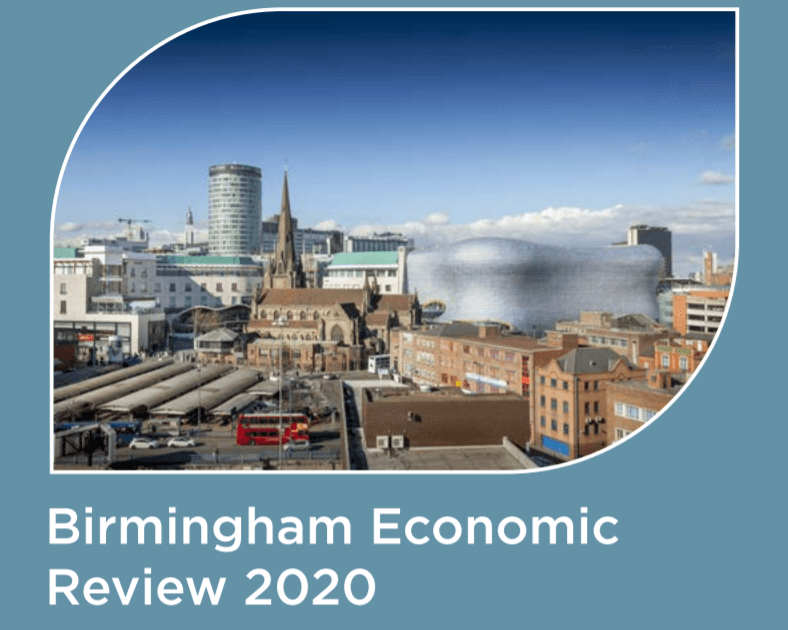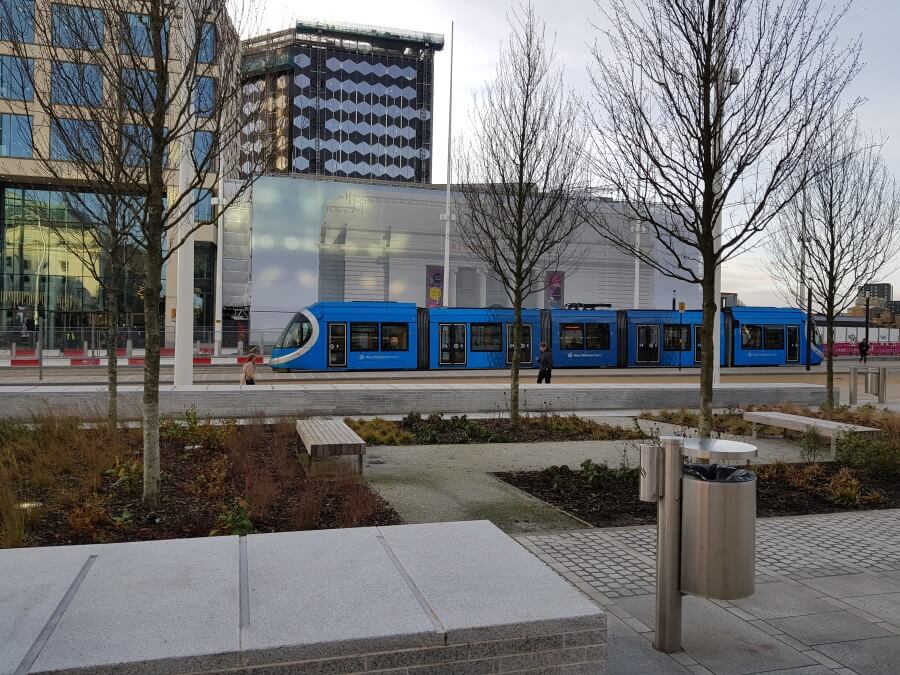
In this blog, Professor Raquel Ortega-Argiles discusses the importance of building economic resilience in places, what Birmingham strengths as a City-Region are, and what areas it needs to develop to become more resilient.
This blog post has been produced to provide insight into the findings of the Birmingham Economic Review.
The Birmingham Economic Review 2020 is produced by City-REDI / WM REDI, University of Birmingham and the Greater Birmingham Chambers of Commerce, with contributions from the West Midlands Growth Company. It is an in-depth exploration of the economy of England’s second city and is a high-quality resource for organisations seeking to understand Birmingham to inform research, policy or investment decisions.
This post is featured in the full report and report summary here.
In the current economic uncertainty, understanding the drivers and pillars of economic resilience of places and how they might be strengthened is crucial. City economic resilience is determined by a combination of good amenities, private and public investments in the form of local assets and infrastructures and good governance and policy measures that can form the base of a good place-based and place-sensitive economic resilience strategy.
Strengths as a City-Region
As the Birmingham Economic Review 2020 shows (BER20), Birmingham as the core city of West Midlands region has a good combination of local key assets that contribute to its identity as a vibrant industrial area outside London, and recently it has been the recipient of substantial investments such as the start of HS2. The West Midlands region is characterised by a broad mix of industries with a strong presence in high-tech manufacturing as well as services, with Business and Professional Services complemented by a network of knowledge clusters and industrial parks and universities. Birmingham and the West Midlands benefit from being located geographically both right at the centre of the country and also close to London, offering high levels of connectivity. This is crucial for attracting talent and investments in public infrastructures (such as HS2 and the airport), private investments (e.g. HSBC) and for developing activities around the areas of logistics and commercialisation. The region is also recognised as being one of the youngest and more diverse areas of the UK. In terms of governance, Birmingham City Council and the Greater Birmingham and Solihull LEP are also backed up by the West Midlands Combined Authority. However, even with this promising combination, this edition of the BER20 shows that according to the most recent data on economic performance measured as the contribution to the economy of each producer, industry or sector in the economy (GVA per head), Birmingham (£25,477) significantly underperforms the UK national average (£28,729) and English average (£29,356). Moreover, Birmingham and its conurbation are also characterised by high internal inequalities in income and skills.

COVID-19
During the last few months, Covid-19 has hit the region harder when compared to most other regions in the UK, for a few main reasons. The first one, in health terms, is that the West Midlands has been one of the most hit UK regions. In economic terms, the West Midlands characterised by a high proportion of high- tech manufacturing which has suffered by the disruption of value-chains having to stop production and having to diversify in other activities and products – such as into medical devices to support health services needed to deal with the pandemic. Other sectors, such as the transport industry, have suffered by Covid-19 mobility restrictions imposed in the country and the move towards teleworking. New Street train station and the Birmingham International airport notably reduced the scale of their operations for some months. The negative economic consequences of Covid-19 in the transport industry have also felt in other sectors, such as hospitality and retail. In the last months, Birmingham has seen the closure of firms such as John Lewis in the city centre. Some policy schemes such as the furlough or the job retention schemes may have helped some of the regional firms in the short-term, however additional policy measures to ensure long-term firm continuity are essential to ensure long-term levels of firm productivity in the city.
Given its industrial structure, COVID-19 is heavily impacting on the West Midlands economy, with car sales plunging to their lowest level since 1946 and new UK car registrations decreasing by 40%. New evidence about the effects of COVID-19 clearly shows that the UK’s most deprived areas are going to suffer more from the effects of the pandemic than the most prosperous ones (KPMG, ONS). KPMG has said that an analysis of the likely impact this year on the UK’s regions showed that the closure of car plants and the mothballing of hundreds of factories connected to the automotive sector meant the West Midlands region’s economy would shrink by 10.1% while London with a more diversified industrial structure will contract only by 7.3% this year. The Covid-19 evidence adds to our Brexit evidence underlining the importance of maintaining global value chain operations for the West Midlands economy and the combination of Brexit and a potential second wave of Covid-19 will be extremely damaging for the region.

The continuity of business and industry is key and calls for a prudent response to the supply- and demand-side effects as soon as the restrictions related to COVID- 19 have been lifted (UNIDO, 2020). To help industry, governments will have to promote initiatives that help secure production from supply chain disruptions, including reorientation towards sourcing from shorter distances and increasing the emphasis on domestic supply chain development. On a positive note, the West Midlands had to adapt to the Covid-19-related adverse business circumstances by repurposing their production lines to switch production to the most-needed goods in the UK. Other firms have reorganised and updated their businesses to make use of telecommuting and e-commerce. Some firms have started rethinking their business models, with supply shortages from overseas leading to an increase in procurement of inputs from local or regional businesses. Innovative and productive economies tend to be more resilient. There is a clear need for a transformation of our local industries to enhance productivity and improve regional resilience by increasing diversification in a new ‘normal’ post- COVID and post-Brexit world. However, diversification, skill and technological upgrading can be costly – because they also require new skills and technical infrastructures – so further longer-term government support is needed to allow industries to adapt to the new conditions with more flexible or hybrid business models that ensure resilience in the medium and long term.
There is also a clear need to prepare our labour force to adapt to the new circumstances. Over the longer-term, this will require us to improve the capacity for transformation using new education, training and business approaches. Clear policy support that can link business needs and education pathways are crucial to assist the recovery process and increase the adaptability of the industrial and knowledge structure to the new reality.
To end with an optimistic note, these resilience issues may also be linked to how Birmingham will be able to benefit from events such as the Coventry 2021 UK City of Culture or the 2022 Commonwealth Games and investments such as the arrival of HS2. Good governance processes of these opportunities, with open and collaborative approaches with different levels of government, will determine the level of success of these investment opportunities.
This blog was written by Professor Raquel Ortega-Argiles, Professor of Regional Economic Development, City-REDI / West Midlands REDI, the University of Birmingham.
Disclaimer:
The opinions presented here belong to the author rather than the University of Birmingham.
To sign up for our blog mailing list, please click here.
